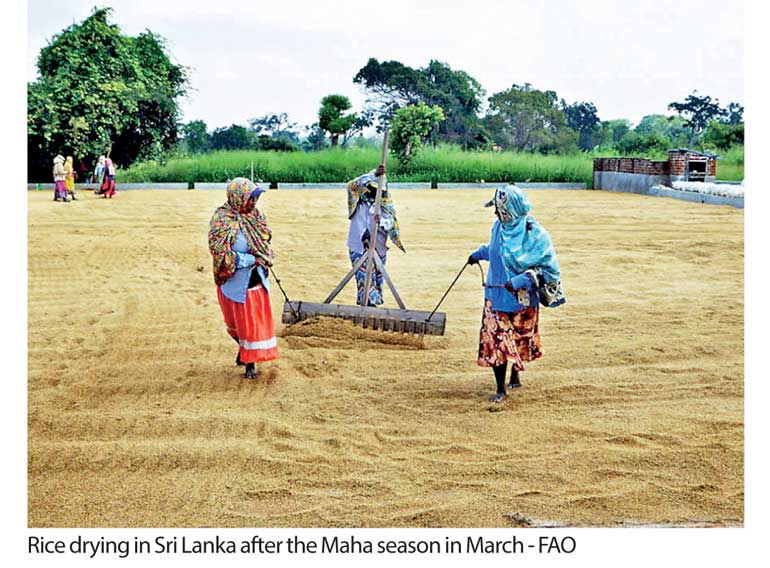Thursday Feb 19, 2026
Thursday Feb 19, 2026
Friday, 23 June 2017 00:00 - - {{hitsCtrl.values.hits}}

A severe drought followed by heavy rainfall in Sri Lanka has hit large swaths of cropping areas, threatening the food security of some 900,000 people, according to a report published yesterday by the Food and Agriculture Organization of the United Nations (FAO) and the United Nations World Food Programme (WFP).
According to the joint Crop and Food Security Assessment Mission, drought conditions in 2016 and early 2017 led to widespread crop failures, in particular for rice paddy - the country’s staple food. Total paddy production in 2017 is forecast at 2.7 million tonnes, almost 40% less than the last year’s output and 35% lower than the average of the previous five years.
Other crops, including various pulses, chillies and onions, which rely mainly on rainwater, were also heavily damaged by the dry weather. The situation was exacerbated by subsequent heavy rainfall in May. Floods and landslides in the south-western parts of the country caused deaths, large population displacements and damage to infrastructure. The rains did not ease the water supply constraints in the drought-impacted north central and eastern parts of the country.
Now nearly 225,000 households (or about 900,000 people) face food insecurity. The most vulnerable groups are struggling to earn an income after losing their own crops and have fewer employment opportunities. In 10 districts, a previous joint assessment showed that about one-third of the drought-affected population had its regular income reduced by more than half, compared to the income generated from the 2015-2016 Maha season.
The situation may further deteriorate if the next cropping season fails. Due to a critical shortage of seeds and a lack of water for irrigation, the second 2017 paddy harvest - known as Yala, due to be harvested in August and September - is forecast at 1.2 million tonnes, 24% below last year’s level.
Most families surveyed would usually grow their own food, but with the bad main harvest many are now forced to buy food from local markets where food prices have risen sharply. Rice prices reached an all-time high in January 2017, reducing the ability of families to access nutritious food.
Many of those affected have been forced to eat less. Interviews with households and market vendors showed that people were buying cheaper food whenever possible. Many reported a reduction in the purchase of meat and fish.
To cover immediate needs, FAO and WFP call for the urgent provision of seeds as well as planting and irrigation equipment for the next Maha planting season from September to December, as well as support for irrigation systems. The poorest and most vulnerable families should also quickly receive targeted cash assistance in order to ensure adequate food intake and to prevent families from incurring unsustainably high debt or adopting other coping mechanisms that affect them negatively over the longer term.
Recognising the increasing frequency of natural disasters affecting the agricultural sector and the impact on food security, it is also recommended to introduce long-term measures to increase farmers’ and households’ resilience to natural disasters and climate change, such as promotion of drought tolerant crops and varieties and livelihood diversification.
The Government yesterday opened immediate talks with three countries to procure a rice tranche to stabilise its domestic markets.
“We are looking for the par-boiled Nadu and Samba categories now,” said Industry and Commerce Minister Rishad Bathiudeen.
Minister Bathiudeen, joined by the Secretary of the Ministry of Industry and Commerce Chinthana Lokuhetti and the Director General of the Finance Ministry P.M.B. Atapattu, was addressing Ambassador Designate of Thailand to Sri Lanka Chulamanee Chartsuwan, Ambassador of Indonesia to Sri Lanka Gusti Ngurah Ardiyasa and Acting High Commissioner of Pakistan Dr. Sarfraz Ahmad Khan Sipra at the Ministry of Industry and Commerce.
“I invited you here on the directive of President Maithripala Sirisena, who aims to strengthen our domestic rice supply. At this week’s Cabinet meeting, the concerned President instructed me to open Government to Government level talks with you for speedy procurement of rice for our domestic market, the reason for inviting you here immediately,” said Minister Bathiudeen when addressing the ambassadors, a statement from the ministry said.
The Sri Lankan Government plans to procure rice through a Government to Government process but is open to private sector support as well if necessary. The Cooperative Wholesale Establishment (CWE) will be the focal point for this effort and will be in contact with the relevant companies continuously.
“After one of you is picked as the supplier of this volume, based on a transparent international procurement process, our expert team consisting of my officials, food technologists and rice experts will arrive in your country to inspect and certify the entire stock before it will be shipped to Colombo.”
The Sri Lankan Government is expecting to import 300,000 metric tonnes.
All the Ambassadors present pledged their immediate support to Minister Bathiudeen and the President’s efforts to procure the rice tranche. They also clarified the processes of Government to Government procurement. The ambassadors from Indonesia and Pakistan even came forward to say that despite the Eid Ul Fitr holidays starting this Saturday in their countries, they shall immediately get in touch with their respective governments as soon as Sri Lanka sends its bidding details and gives them the go-ahead.